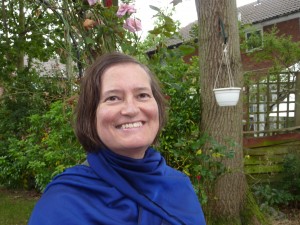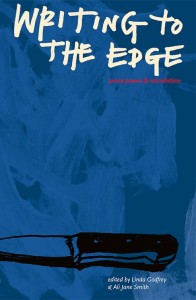 1. What inspired you to write the prose poem/microfiction which will appear in Writing To The Edge?
1. What inspired you to write the prose poem/microfiction which will appear in Writing To The Edge?
The memory of my sister and I climbing the pine trees at the side of the house was prompted by her sudden death after a short illness. I began thinking of the shape of our lives, how we seemed to keep running round one corner after another with no idea of what was coming next. Planning one thing, doing another. The poem took off from there. I was also imagining myself as a bird, flying over the river and up to the pines. I like to watch the movement of birds, flying one way then suddenly veering off in another direction.
2. Tell us about your process. (Do you start sparse and widen out, or do you write down every possible association and cut back? Do you research the subject matter you are writing about? Is it pure intuition?) Take us through an example if you want.
I write first in longhand until I can’t read the text anymore because of all the additions and crossings out. Only then do I transfer it to the computer. Often, after several drafts the poem may morph into something I don’t like at all or just go wooden on me. Then I go back to the handwritten piece and start again. A poem is rarely ‘found’ for me. I usually have to cut back, especially those phrases that sound great at the time but aren’t adding anything to the poem. Reading aloud as I edit helps this process a lot.
3. What advice do you have for other writers? (About the first or last line? About how to choose the title? Do you follow any rules?)
No, I don’t follow any rules. What works for me is to try and see the first line as the jumping off point so that everything after that hangs on this line, but the end is not clear until you get there. I like endings that surprise me but also point to something universal. Titles are often the hardest part of a poem. I always hope to find a phrase within the poem that will work as one! Failing that, I play around with phrases or put the poem away for a while. But again, there are no rules.
4. Who or what inspires your writing?
I keep several folders; one with notes and bits of conversations I’ve jotted down when I’ve been riding buses or walking around, another of newspaper cuttings and pictures from magazines, and one for dreams. I can be inspired by anything, really. And I read a lot. My early childhood was somewhat isolated but it instilled in me a love of animals and the natural world. It also made me curious as to how other people lived, particularly in different cultures.
5. Tell us what you do if you haven’t written anything in a while and you want to get started writing again? Could you share your favourite writing exercise with our readers?
The first thing I do is go for a walk, get out of my head! Sometimes, if I sit at my desk and read letters, particularly Jean Rhys’s at the moment, I’ll start wondering about something and that will lead to some new writing. Mostly I go back over my folders and see if anything jumps out at me. Any exercise that takes you out of your comfort zone and makes you play with words in a different way is likely to be helpful. I like taking a phrase I’ve overheard, putting it together with a word from a song and a sentence from a newspaper and seeing what happens.

